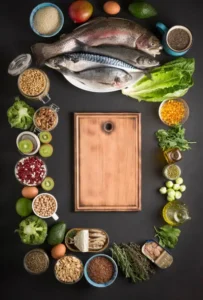Protein: Your Body’s Everyday Superheroes. Protein has become the talk of the town, often hailed as the secret weapon behind strength gains, glowing skin, and endless energy. It seems everyone’s talking about it, whether in those gym conversations, food labels, or health blogs. However, let’s pause for a moment. What is protein? And why does everyone keep going on about it like it’s the magical key to a healthier life?
If you’ve ever felt a little confused or overwhelmed about protein, how much you need, where to get it, or even why it matters, don’t worry. You’re not alone. Let’s sit down and have a heart-to-heart about this powerful little nutrient.
What Exactly Is Protein?
Consider protein to be one of your body’s building blocks. Consider your body as a lovely, complicated home. Proteins! That’s the wood, the nails, the bricks, the cement, everything holding that house together. It helps build your muscles, repair your tissues, make enzymes and hormones, and even support your skin, hair, and nails. Protein: Your Body’s Everyday Superheroes.
Your body lives on protein, whether you’re running a marathon, chasing after kids, recovering from an illness, or just enjoying a cozy nap on the couch.
Do I Need That Much Protein?
The short answer? Yes, but not in a scary, overwhelming way.
Your body needs protein every single day. But how much exactly depends on you. Your age, weight, activity level, and overall health all play a part. For most adults, a general guideline is about 0.8 grams of protein per kilogram of body weight. That’s about 46 grams a day for women and 56 grams for men, on average.
But if you’re active, trying to build muscle, recovering from surgery, or managing a health condition, you might need a little more.
And hey, if you’re just getting started on paying attention to your protein intake, don’t stress. You don’t have to hit the perfect number right away. The first step is to simply be more conscious.
Signs You Might Not Be Getting Enough
Here are some subtle cues that your body may be giving you:
- You’re often tired for no clear reason.
- Your hair feels thinner or starts falling out.
- Your nails feel weak or brittle.
- You’re losing muscle or not gaining strength, even if you’re working out.
- You feel hungry soon after eating.
- You’re getting sick more often.
If any of these sound familiar, it doesn’t mean it’s a protein problem, but it might be worth looking into.
Where Can I Get Protein From?
Here comes the good part: food! And trust me, protein isn’t just about grilled chicken and boiled eggs (though those are great too). There’s a big, beautiful world of protein-rich foods out there, and you don’t need to be a gym rat or health nut to enjoy them.
Animal-Based Protein Sources:
These are often considered “complete” proteins because they have all the essential amino acids your body needs.
- Eggs (one of the cheapest, most versatile sources!)
- Chicken, turkey, beef, lamb
- Fish like salmon, tuna, or sardines
- Dairy: milk, cheese, Greek yogurt
- Cottage cheese (hello, paneer lovers!)

Plant-Based Protein Sources:
Perfect for vegetarians, vegans, or just anyone looking to mix things up.
- Lentils and beans (daal, rajma, chana—you name it!)
- Chickpeas
- Tofu and tempeh
- Nuts and seeds (almonds, chia, sunflower, pumpkin)
- Quinoa (a sneaky grain that’s a complete protein!)
- Peas and soybeans
- Whole grains like oats and brown rice
And if you’re someone who struggles to get enough protein through food alone, protein powders can be a helpful supplement, but they’re not mandatory for everyone. Think of them as a helpful sidekick, not a replacement for real food.
Quick & Easy Ways to Add More Protein to Your Day
You don’t need to completely overhaul your diet. Sometimes the smallest adjustments have the biggest impact:
- Add an egg to your breakfast toast.
- Sprinkle seeds over your yogurt or cereal.
- Mix a spoonful of peanut butter into your smoothie.
- Choose Greek yogurt over regular for a protein boost.
- Add a handful of cooked lentils to soups, curries, or even salads.
- Snack on a boiled egg, roasted chickpeas, or trail mix instead of chips.
See? Simple, everyday stuff.
But… Can You Have Too Much Protein?
Great question, and I love that you’re thinking about balance.
Yes, like anything in life, too much of a good thing can be… well, not so good. Eating excessively high amounts of protein, especially from processed or fatty sources, can put a strain on your kidneys and digestion. But for most people, especially those eating moderate or even high-protein diets from whole food sources, there’s no need to panic.
The key here? Listen to your body. Stay hydrated. And mix things up with a variety of foods.
For My Vegetarian & Vegan Friends
Let me give you a warm hug, because yes, you can meet your protein needs without eating meat or dairy. It might take a tiny bit more planning, but it’s doable.
Focus on combining different plant proteins (like beans and rice) to get all the essential amino acids. Don’t be afraid to experiment in the kitchen. Try tofu stir-fries, chickpea salads, nutty smoothies, and hearty lentil soups. Your taste buds and your body will thank you.
A Quick Myth Check: Will Eating Protein Make Me Bulky?
Nope, not unless you’re working toward that with intentional strength training and surplus calories.
Protein supports muscle repair and growth, yes. But simply eating protein won’t automatically turn you into a bodybuilder overnight. What it can do is help you feel full longer, maintain your energy, support your body during workouts, and keep you feeling strong and balanced. Protein: Your Body’s Everyday Superheroes.

Wrapping It Up
Nutrition can sometimes feel like a puzzle with too many pieces. But think of protein as one of the corner pieces that helps everything else fall into place.
You don’t have to obsess over each bite or weigh every gram. Just start by paying attention. Add a little more protein where you can. Try something new. Listen to your body.
It’s more than enough that you’re trying your hardest.
Here’s to feeling stronger, more energized, and more you, one delicious bite at a time. Protein: Your Body’s Everyday Superheroes.
Frequently Asked Questions
1. How much protein do I need every day?
For most adults, around 46–56 grams per day is enough. But if you’re active, working out, or recovering from an illness, your body might need a bit more. Always pay attention to your body’s needs and strive for a balanced diet.
2. Is protein only important for people who go to the gym?
Not at all! Protein is essential for everyone, whether you’re working a desk job, taking care of your family, or studying all day. Your muscles, skin, hair, and even your immune system rely on it.
3. I’m a vegetarian; can I still get enough protein?
Absolutely! There are plenty of plant-based protein sources like lentils, chickpeas, kidney beans, tofu, paneer, quinoa, nuts, seeds, and oats. Mixing different foods throughout the day helps you get complete protein.
4. Do I need to take protein powders?
Not necessarily. If you’re meeting your protein needs through food, there’s no need to add supplements. But if you’re struggling to hit your target (due to a busy lifestyle or fitness goals), a good-quality protein powder can help.
5. Can too much protein harm my kidneys?
Protein is generally safe if your kidneys are healthy and you’re eating a balanced diet. Like anything, moderation is key. Please don’t overdo it, and you’re good to go!

